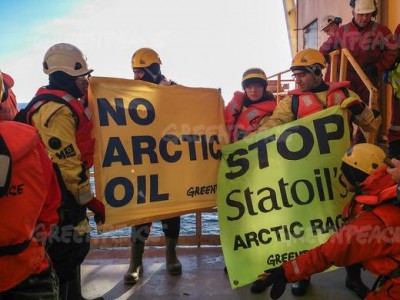Page added on January 19, 2017
Expert warns of Arctic drilling risks
A highly acclaimed Oxford professor who’s considered an expert on energy research has thrown cold water on Norway’s hopes for a new oil era in the Arctic. Dieter Helm doesn’t think oil prices will rise much higher and are more likely to fall, making costly oil investments in the Barents Sea unprofitable.

Environmental activists have been at the forefront of warning about the risks of Arctic oil exploration and production. An Oxford professor and energy expert claims the economic risks are high as well. PHOTO: Greenpeace
Helm, addressing an annual gathering of top oil industry officials in Sandefjord this week, said that an oil price of USD 50 a barrel is in fact high in historical perspective, even though it’s half of what it was just a few years ago. He thinks the current level of around USD 54, which has doubled in the past year but remains far below record levels, will eventually decline because there’s “plenty” of oil around that can be produced profitably at a price of USD 50 a barrel or even lower.
He also predicts that oil prices will fall again, telling newspaper Dagens Næringsliv (DN) that oil-producing countries will vigorously pump up their resources when they discover that prices are falling. Helm believes demand for oil will peak during the next 10 years, as digitalization and electrification of economies take over.
Risky business in forging ahead
Helm thus warned Norway against developing its Arctic areas, as it’s controversially doing now. Norway’s state oil ministry just granted 56 new production licenses in what it called the country’s “best known areas,” claiming that “many players see great and long-term business opportunities” in Norway’s petroleum resources. Most of the licenses (36) were granted in the North Sea along with 17 in the Norwegian Sea and three in the Barents. A total of 33 companies applied for production and operating licenses and 29 were offered shares in one or more fields, 17 of them as operators.
While companies like Wintershall of Germany proudly announced that they had been awarded licenses on the Norwegian Continental Shelf, news bureau NTB noted that oil majors like Shell pulled out of the 23rd licensing round and ExxonMobil isn’t active off Norway. Norwegian fields are no longer as attractive to international oil giants, noted economist and professor Klaus Mohn. A spokesman for Norway’s own Statoil, which won the majority of licenses, acknowledged that offshore activity was “more demanding” now because of the need to lower costs and set harder priorities.
‘Is it worth it?’
Helm also claimed that exploring and producing in the Barents Sea is especially risky. Costs are still “very high,” he told DN, and oil companies have to ask themselves “whether it’s worth it.” He cited “technological challenges” as well. “The question is whether you have the technology,” Helm said, and even if companies do, he added that the prospect that demand can peak within the next decade makes the idea that there are large discoveries to make in the Barents “less attractive” than it was just five years ago.
“It’s very risky,” Helm said, purely from a business standpoint. In addition come all the concerns about climate change and environmental damage that oil activity can cause.
Helm does think Norway’s economy will ultimately prevail over the next few decades despite a shift away from oil. “Norway is one of the few countries that has the political institutions, the social structure and education system to manage through this change,” he told DN. He also said Norway was an attractive place to live: “Would you rather live in the smog of Beijing, or Oslo?” he queried.
Norwegians still bullish
Top Norwegian oil analyst Jarand Rystad of Rystad Energy and industry veteran Ståle Kyllingstad said they don’t share Helm’s predictions. “His belief that oil demand will peak during the 2020s is not very well-documented,” Rystad told DN. Kyllingstad, meanwhile, claims Norway has the technology to bring down costs “and they will come down.” Others have pointed out that oil prices have doubled since this time last year, and prospects for the industry were improving, not deteriorating further.
Helm got some support earlier at the Sandefjord conference from oil industry veterans like Eivind Reiten, a former CEO at Norsk Hydro when it was still in the oil business. Reitan said he doesn’t think the oil business will manage to keep costs down when oil prices rise. Statoil CEO Eldar Sætre wondered, meanwhile, whether the business was “operating in our own echo chamber” and not playing an active-enough role in promoting the oil industry’s importance for Norway’s economy. He’s still pushing for rights to explore and drill off some of the most scenic portions of the Norwegian coast at Lofoten, Vesterålen and Senja. “We need new possibilities and new areas” for oil activity after 2020, he said.
Statoil’s Sætre then took off for Switzerland to attend the annual World Economic Forum in Davos, which attracts top politicians and industry executives from around the world. He noted once there that oil investments have been “much lower” the last two years and are expected to be even lower this year. He thinks Statoil is now positioned, however, to live with lower oil prices. “We are more robust in a low-price regime than we were a few years ago,” he said, and he’s still bullish on oil activity in Norwegian waters. Analyst firm Wood Mackenzie confirmed that Statoil is among oil companies that have continued to invest during the past few “crisis” years, standing for fully 40 percent of investment decisions made in 2015 and 2016.
10 Comments on "Expert warns of Arctic drilling risks"


penury on Thu, 19th Jan 2017 12:23 pm
I think that producers are failing to consider one of the other legs of the triangle. Yes, it is entirely possible that production can be increased. However, can utilization be increased to match production? The economies of the world are burdened with unpayable debt. people can not afford the cost of pay backs, and certainly cannot afford any new debt. Fun times are approaching.
Apneaman on Thu, 19th Jan 2017 12:41 pm
“many players see great and long-term business opportunities”
Really? That’s because they are clueless fucking morons who believe civilization has a future – it don’t except for another minute or two. The species has about 10.
Climate science bedeviled by ‘tipping points’
“Of the many things that keep climate scientists awake at night, tipping points may be the scariest.
To start with, these thresholds for deep, sometimes catastrophic change in the complex web of Earth’s natural forces, caused by man-made global warming, are largely invisible.
You can’t see them on the horizon, and could easily cross one without noticing.
Also, there is no turning back—at least not on a human timescale.”
“But scientists also admit their tools are better at measuring steady, linear progressions than sudden shifts.
“In general, climate models are too stable,” said Drijfhout.
“They are calibrated to the present climate, have difficulty simulating the abrupt changes we have witnessed in the geological past.”
“Concentrations of CO2 in the atmosphere today are higher than any time in the last three million years, and are increasing more rapidly than at any point in the last 66 million years.”
Read more at: https://phys.org/news/2017-01-climate-science-bedeviled.html#jCp
Even this is overly conservative, but science is conservative by nature and scientists are conservative by training, but also nervous to come right out and say just how bad it is due to the hostile circumstances they are operating in. Luck for y’all, I’m here to enlighten you with the truth of how awful it is, so you may prepare accordingly. No need to thank me.
Climate Science Predictions Prove Too Conservative
Checking 20 years worth of projections shows that the Intergovernmental Panel on Climate Change has consistently underestimated the pace and impacts of global warming
https://www.scientificamerican.com/article/climate-science-predictions-prove-too-conservative/
Scientific community is self-censoring research to conform to views of vested interests
““[There is an] endemic bias prevalent amongst many of those developing emission scenarios to severely underplay the scale of the 2°C mitigation challenge. In several important respects the modelling community is self-censoring its research to conform to the dominant political and economic paradigm. Moreover, there is a widespread reluctance of many within the climate change community to speak out against unsupported assertions that an evolution of ‘business as usual’ is compatible with the IPCC’s 2°C carbon budgets. With specific reference to energy, this analysis concludes that even a slim chance of “keeping below” a 2°C rise, now demands a revolution in how we both consume and produce energy. Such a rapid and deep transition will have profound implications for the framing of contemporary society and is far removed from the rhetoric of green growth that increasingly dominates the climate change agenda.” —Kevin Anderson”
https://citizenactionmonitor.wordpress.com/2015/10/17/scientific-community-is-self-censoring-research-to-conform-to-views-of-vested-interests/
Apneaman on Thu, 19th Jan 2017 12:43 pm
Top global threats for 2017: Terrorist attacks, large-scale migration and extreme weather, warns World Economic Forum
Climate change is the ‘most pressing’ risk for the coming year, the study says
“The Global Risks Report, which is informed by the views of 750 threat experts, ranks emerging dangers in order of probability, with catastrophic weather and mass migration assessed as most likely to happen.”
http://www.independent.co.uk/news/world/top-global-threats-2017-terrorist-attacks-large-scale-migration-extreme-weather-world-economic-forum-a7533871.html
Apneaman on Thu, 19th Jan 2017 12:45 pm
Cancer eats healthy tissue.
Sand mines used to frack oil & gas are destroying the best topsoil in the Midwest
http://energyskeptic.com/2017/sand-mines-used-to-frack-oil-gas-are-destroying-the-best-topsoil-in-the-midwest/
penury on Thu, 19th Jan 2017 1:31 pm
Somebody, I forget who said “you cannot expect a man to notice a problem if his position requires him to not see it, (very poor paraphrase i do apoligise)
Dredd on Thu, 19th Jan 2017 2:02 pm
WE already saw this movie recently (Barry & Oil-Qaeda vs Arctic Wilderness, 2).
What’s up, episode two?
Boat on Thu, 19th Jan 2017 2:34 pm
So Helm thinks demand tops off in 10 years. Most oil demand comes from transportation. While I may be as big a fan as Kenz about electric cars they are just going to be to expensive for the masses in 10 years. Even when electric cars become the cheapest per mile to operate it will take a long time to scale.
shortonoil on Thu, 19th Jan 2017 4:55 pm
“plenty” of oil around that can be produced profitably at a price of USD 50 a barrel or even lower.
If there is plenty of low cost oil then why is no one replacing their reserves? For the petroleum, or any extractive resource industry industry that is tantamount to going out of business. Maybe this “expert” believes that you don’t need oil to be in the oil business?
Boat on Thu, 19th Jan 2017 6:09 pm
Short,
Why look for it when you can buy it. Google Exon spends 6 billion on Texas oil. This is the same oil you have been ranting about for years that is just a Ponzi scheme. We have been talking about bankrupt oil reserves being snapped up. Yep, they gonna drill in them reserves boy. Ponzi is alive and kicking. Lol
Harquebus on Thu, 19th Jan 2017 8:45 pm
“It is difficult to get a man to understand something when his salary depends upon his not understanding it.” — Upton Sinclair